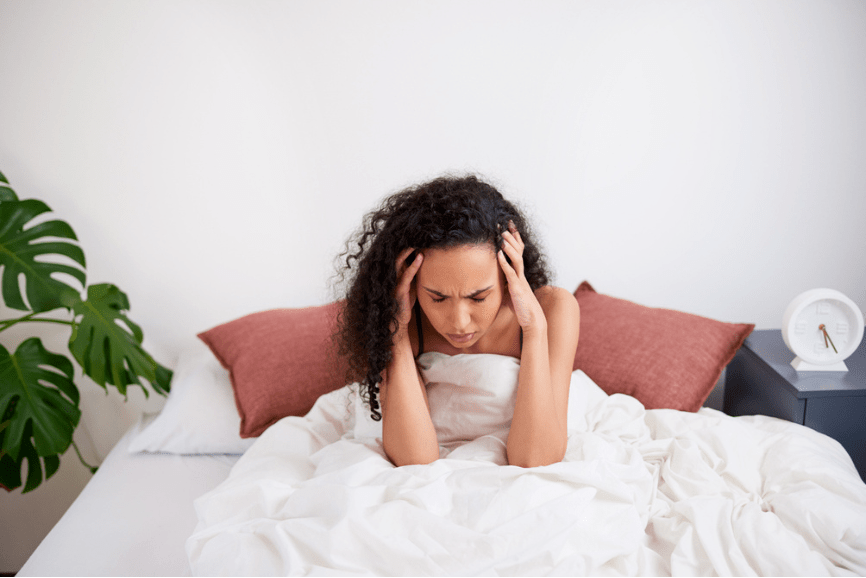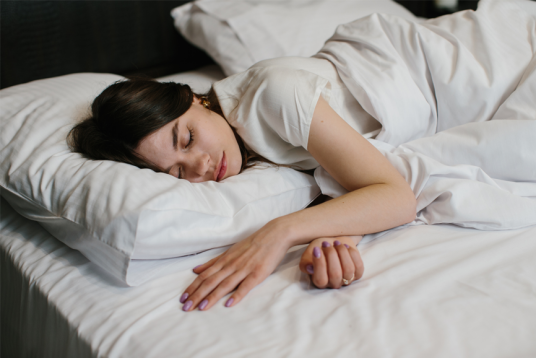Health & Wellbeing
Sleep Struggles & Solutions
March 21, 2024

We’ve all heard how sleep is crucial for our physical and mental well-being, however, as we age getting enough, high-quality sleep can become difficult. From new routines to hormonal changes and nighttime leg cramps, many challenges work against our natural sleep rhythms. Fortunately, there are steps that you can take to get a peaceful night’s rest.
The Stages of Sleep
First, we have to understand what happens to us when we sleep. Adults of all ages are recommended to get at least 7 hours of sleep a night; during this time our body cycles through four sleep stages in 90-minute intervals.
During stage one (N1) we enter the lightest sleep stage where our body starts to relax; signified by our breathing, heart rate, and eye movement slowing. In the second and longest stage of sleep (N2) these bodily functions continue to slow and our body temperature drops. Then we enter the third stage of sleep (N3) which is the deepest most relaxed sleep and contributes to how refreshed we feel the next day. Finally, we enter rapid-eye-movement (REM) sleep, this is where body functions start to speed up as our brain works to process all the information we have taken in during the day.
Each of these stages is crucial to help our bodies and minds reset for the next day ahead. Unfortunately, as we age there are a few factors that can make falling asleep and staying asleep more difficult.
Some Factors that Negatively Impact Sleep
Inconsistent routines
After retirement, it can become difficult to maintain strong routines around waking and bedtime. This negatively impacts our sleep-focused circadian rhythms which help our bodies to become sleepy before bed.
Lack of sunlight
Sunlight is also linked to our circadian rhythms as it helps our body clock reset each morning. The less light we see during the morning, the more confused our body clock becomes which becomes an issue at bedtime later on. Older individuals may become more inclined to spend less time outdoors which contributes to a lack of sunlight.
Changing hormones
As we age our hormones also change. The body secretes less melatonin (the sleepy hormone) as we grow older which can make it difficult to feel sleepy during the evenings.
Nighttime cramping
Leg cramping at night is something that can increase in older individuals due to shortening tendons as you age. This issue can significantly disrupt sleep when it happens and keep you up afterward due to pain or discomfort.
Sleep Solutions
Fortunately, there are some strategies that you can put in place to maintain good sleep habits such as creating a healthy sleep routine and environment, as well as taking steps to prevent nighttime disruptions.
- This can start in the morning by waking at the same time each day and ensuring you get exposure to sunlight first thing in the morning or as soon as possible.
- Throughout the day, refrain from consuming caffeine, tobacco, alcohol, and large meals specifically in the evening as these all negatively impact sleep. Also, aim to participate in light/moderate exercise each day.
- As it gets closer to bedtime, reduce screen time and other light exposure, take a hot bath to relax your muscles, stretch, and use a product like Crampeze if you suffer from leg cramps or spasms.
Summary
While aging can present challenges to achieving quality sleep, understanding these obstacles allows for effective solutions. By being aware of how our sleep cycles work and prioritising these strategies, you can foster restorative sleep and enhance your overall well-being as you age.
Recommendations
References
Albert, SM., Alessi, C., Bruni, O., Hirshkowitz, M., & Whiton, K. (2015). The National Sleep Foundation’s sleep time duration recommendations: methodology and results summary. Sleep Health, 1(1), 40-43.
Singh, A., & Suni, E. (2023, December 8). Stages of Sleep: What Happens in a Sleep Cycle. Sleep Foundation. https://www.sleepfoundation.org/stages-of-sleep
DeBanto, J., & Newsom, R. (2023, September 19). Aging and Sleep. Sleep Foundation. https://www.sleepfoundation.org/aging-and-sleep


